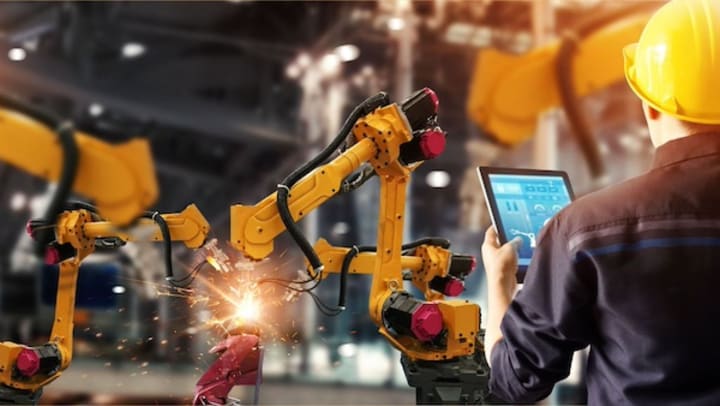An introduction to control systems engineering
What it is, the advantages, and types of control systems

Control systems engineering is an important discipline of engineering that can help streamline business processes alongside improving efficiency. If you are new to this engineering discipline, here is an introduction to control systems engineering.
What is control systems engineering?

Control systems engineering is the process of designing, analysing, and optimising control systems. Control systems are used in manufacturing and other mechanical operations to manage, command, direct, and regulate the behaviour of devices or systems. This is done through control loops.
Both mechanical and electronic components can make up a control system, all with the common goal of output control. Such control systems can range from simple setups that use a single input-output to larger, more complex systems, such as controlling automation and robotics.
The different areas of engineering where control systems can be used include:
• Aerospace engineering – controlling aerospace systems, including aircraft navigation and rocket trajectories.
• Manufacturing - aiding assembly lines, increasing productivity, and ensuring focused processes.
• Chemical processing - helps achieve a desired output that achieves a desired quality and capacity and ensures stable and efficient plant operations.
• Robotics - such as programming robotics, to perform specific tasks with greater precision and accuracy.
• Automotive engineering – automating and improving the efficiency of automotive engineering, including configurations and vehicular system designs.
• Energy - implemented into energy plants to help control power flow and keep systems stable while operating efficiently.
Control systems engineering (or control engineering) is a discipline of engineering that focuses on designing, analysing, and optimising control systems. Control systems engineering is a growing discipline with many opportunities and control systems engineering jobs available.
Why is control systems engineering important?

Control systems engineering is important because it provides a strategic method to increase productivity. Implementing control systems can help minimise human errors and eliminate redundant manual controls that can be expensive.
Additionally, implementing control systems can help a company to enhance its best practices. However, to ensure this, frequent evaluations are necessary. This helps maintain processes and ensure they function efficiently and effectively.
Another reason why control systems engineering is important is it provides remote monitoring and management for businesses operating in multiple locations. Implementing control systems in these situations helps each location to work in sync.
Control systems engineering should form part of a continuous improvement process. As a business learns and develops more about its control systems and becomes more familiar with its working, changes and improvements can be made.
For maximum efficiency and effectiveness, engineers should be proactive and monitor multiple endpoints simultaneously. This helps to spot problems much sooner and eliminates discovering problems too late after they have occurred.
Implementing control systems is also a way for a businesses to be proactive and provide customers with the best possible experience. Implementing remote control system monitoring and management is one of the most effective ways for businesses to achieve this.
What are the advantages of control systems engineering?
Here are some of the benefits of control systems engineering:
• Greater accuracy and precision
• Higher productivity and efficiency
• Save costs through automation
• Better safety
• Simultaneously monitor and control multiple processes
• Less downtime and waste
How many different types of control systems are there?

There are many different types of control systems, including:
Discrete process control systems
These simple control systems help handle processes, such as adjusting temperatures or switching a system off. A predetermined value is set in the control system that, when reached, will switch off when the quantifiable value parameter is exceeded.
Such systems also allow for direct manipulation, meaning these systems can also be manually switched off for maintenance. Discrete process control systems are mainly used in small-scale production and may have someone monitoring the system.
Distributed process control systems
Unlike discrete process control systems, distributed process control systems are much more complex and will monitor a much more complex system. These control systems can track multiple control device types, helping to automate processes.
Distributed process control systems can also have systems installed for manual shutdown if a safety parameter is breached. Such systems can also communicate information to different production facility sections.
Closed-loop control systems
These use feedback so adjustments can be made to system output. This helps maintain specific setpoints or conditions. Closed-loop control systems continually monitor and compare their outputs with a desired value. If necessary, it will adjust to ensure the correct output. Most do not consider their systems where accuracy and precision are vital.
Open-loop control systems
Also known as non-feedback control systems, these use pre-determined input sets to control their outputs. Unlike closed-loop control systems, open-loop control systems do not consider their output value. These systems are most commonly for systems where an output doesn’t require regulation.
With the different types of control systems available and the great benefits businesses can receive, it highlights how important control engineering is. As control systems and automation continue to develop and grow, there is a much greater demand for control engineers in technical recruitment.





Comments
There are no comments for this story
Be the first to respond and start the conversation.